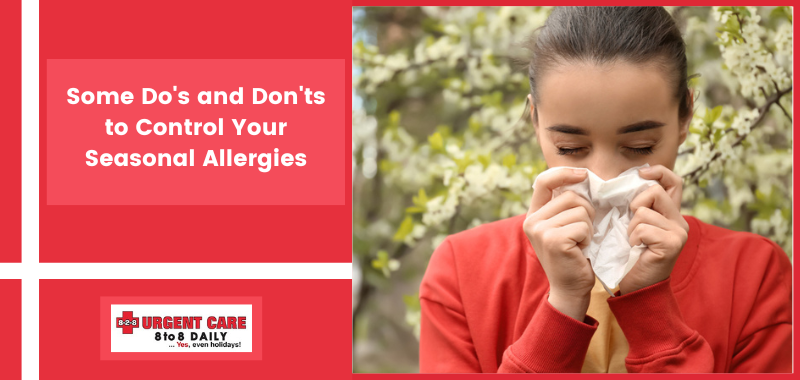


Spring is the season of blooming flowers, chirping birds, and itchy eyes, runny noses, and constant sneezing? If you're one of the millions who suffer from seasonal allergies, you know the struggle is real. While allergies can't be cured entirely, there are ways to manage them and minimize those bothersome symptoms. Let's continue reading to explore some do's and don'ts for effective seasonal allergy management to breathe easier this season.
They are as follows:
Knowledge is power! Track pollen counts in your area. Many weather apps and websites provide daily updates. Knowing peak pollen times (usually early mornings and evenings) allows you to plan your outdoor activities accordingly. Consider staying indoors during these high-count periods.
Don't wait for symptoms to appear before taking action. Consult your healthcare provider to discuss starting allergy medication – often antihistamines or nasal corticosteroids – well before allergy season begins. This proactive approach can significantly reduce symptom severity.
Your home should be a sanctuary from allergens. Wash bedding in hot water weekly to remove pollen and dust mites. Invest in a high-efficiency particulate air (HEPA) filter for your air conditioner or air purifier to trap airborne allergens. Regularly vacuum carpets and rugs, paying close attention to furniture and corners where dust tends to accumulate.
Pollen and other allergens can hitch a ride on your hair and clothes. After spending time outdoors, especially during peak pollen hours, shower and change into fresh clothes. This simple step can significantly reduce allergens in your living space.
Keep windows closed during peak pollen times. Consider using a dehumidifier indoors to control mold growth, another potential allergy trigger.
They are as follows:
While mask-wearing might not be as common as it once was, it can still be a valuable tool during allergy season. A well-fitting mask can help filter out pollen and other airborne allergens, especially during high-count days.
The itch might be intense, but rubbing your eyes can irritate them further and even worsen symptoms. Opt for cool compresses or lubricating eye drops to soothe itchy eyes.
While sun-dried laundry might feel fresh, it's an open invitation for pollen to settle on your clothes. During allergy season, stick to indoor drying on a drying rack or use a clothes dryer.
If over-the-counter medications aren't providing adequate relief, or if your symptoms are accompanied by fever, difficulty breathing, or facial swelling, don't hesitate to seek medical attention.
Regular nasal saline irrigation, also known as a neti pot, can help remove pollen and other allergens from your nasal passages, reducing congestion and irritation.
By following these simple do's and don'ts, you can significantly reduce your seasonal allergy symptoms and enjoy a more comfortable spring, summer, or fall (depending on your specific triggers). Remember, consistency is key! Implementing these strategies as a regular practice will maximize their effectiveness.
Don't let allergies hold you back from enjoying the beauty of the spring season. If you're struggling with persistent symptoms and need personalized advice, visit 8-2-8 Urgent Care today! Our experienced team can diagnose your allergies, recommend appropriate treatment options, and get you back on track to feeling your best. Take control of your allergies and breathe easy this season! Contact us at 8-2-8 Urgent Care, and our staff will walk you through our self-check-in process from the convenience of your home! Call (760) 216-6253.